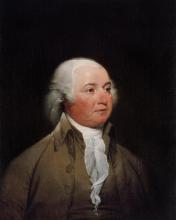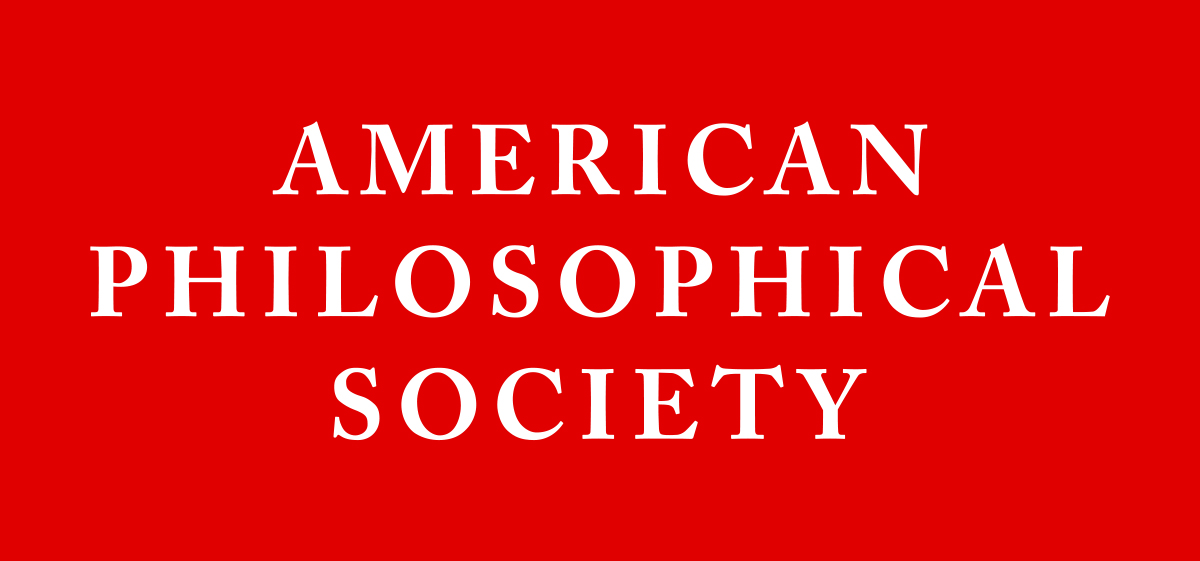John Adams (391)
Election date: 1780 
John Adams (19 October 1735–4 July 1826) was a lawyer, statesman, diplomat, second President of the United States of America, and a member of the American Philosophical Society, elected in 1780. Born in Braintree (later Quincy), Massachusetts to shoemaker, farmer, and officeholder John Adams, Sr., and his wife, Susanna, the junior Adams had a childhood rife with outdoor amusements before he entered Harvard College. Defying his father’s wishes for him to be a clergyman, Adams pursued law exclusively. He graduated (1755), began reading law in Worcester (1756), gained admission to the Braintree bar (1758), and became barrister before the Massachusetts superior court (1762). Two years later, established in his career and having inherited his father’s estate, Adams married the formidable Abigail Smith (known thereafter as Abigail Adams), who would act as his advisor for the rest of her life.
In 1765, Adams's career began to intertwine with the rising tension between the American Colonies and the British Empire: in his popular essays protesting the Stamp Act and his Braintree Resolves, he established sentiments that shaped the later American Independence movement. The Adamses relocated to Boston in 1768, where the conflict between the colonies and the Empire began to reach a boiling point. Adams threw himself right into the pot: he defended rebel wine-smuggler John Hancock against the British Empire (1768), and then the Imperial troops charged with initiating the Boston Massacre (1770). Though the latter supposedly injured his career, colonist support won him the election to the Massachusetts General Court that same year. He had a brief illness or mental breakdown from 1771 to 1772, meanwhile, his newspaper essays were some of the first to declare autonomy from British parliament and support the Boston Tea Party (1773). The following year, the Massachusetts House nominated Adams to the first continental congress in Philadelphia, so as to counter British repercussions brought on by the Boston Tea Party. He briefly returned to Boston before scurrying back to Philadelphia after the outbreak of hostilities at Lexington and Concord (1775).
Taking charge in the Second Continental Congress, Adams proposed a Continental Army with George Washington as commander-in-chief and thereby threw himself into the project of facilitating said army through tireless work in numerous Congressional committees. Adams also pleaded the case for a Declaration of Independence, and thereby landed a spot on the drafting committee. In his response to Thomas Paine’s Common Sense, Thoughts on Government (1776), Adams further proved himself an architect of American republicanism: making a case for two balanced legislative chambers with a strong executive at the head. He returned home to Boston exhausted in 1777, only to find out later that year that Congress had decided to ship him off to Paris to join Benjamin Franklin and Arthur Lee in the crucial negotiations at Versailles. John Adams and his son, John Quincy Adams, landed in France in 1788, only to find an alliance with France had already been secured whilst the two were still crossing the Atlantic. Nevertheless, he organized much of the new commission, and made an unfruitful attempt to secure additional naval aid from the French. The following year, he joined the Massachusetts Constitutional Convention, wherein he composed the state’s constitution, the oldest of its kind still in effect. Despite his evident knack for political theory—and lack for diplomacy—Adams found himself diverted yet again, now as sole minister plenipotentiary to Great Britain. Peace seeming a premature goal, Adams relocated to Holland, and was able to produce a Dutch loan, Dutch recognition of his fledgling nation, and a treaty of amity and commerce, all by fall of 1782. He then returned to Paris to contribute to the 1783 Treaty of Peace with Britain.
Remaining in Europe for another five years, his wife and daughter joined him (1784), and Adams became the first American minister to England (1785), a position destined to be of little consequence considering the fresh wound dealt to Great Britain by the United States. Instead, the reluctant minister occupied himself by signing a commercial treaty with Paris (1786), and publishing three volumes of his A Defence of the Constitutions of the United States (1787-1788), where he continued to advocate for a strong executive and balanced legislative bodies.
Adams returned home in 1788 with something of a heroic reputation, as his Defence had lent itself to the drafting process of the new United States Constitution. Even so, the following year Adams found himself cast into another disappointingly inconsequential role: Vice President of the United States. His support of lifetime-presidency and propensity for tradition made some believe he was flirting with monarchism and earned him many enemies, namely one Alexander Hamilton. Despite this, after two terms in what he deemed “the most insignificant office that ever the invention of man contrived,” he won election to the presidency in 1796. Assuming office in 1797, Adams inherited sticky diplomatic relations with France. Seemingly on the brink of war, he tested just how far he could stretch his newfound presidential powers: he strengthened the navy, passed the Alien Act to deport recent French immigrants and their sympathizers, and the Sedition Act to silence his media critics. Sullying his republican reputation, dividing the Federalists, and likely costing him his reelection in the process, Adams's authoritarian measures successfully prevented full-on war with France nevertheless. Estranged from his once friendly successor, Thomas Jefferson, and something of a villain in the public eye, Adams retired from politics only to reconcile with Jefferson over a decade later after the intervention of APS Member Benjamin Rush. The Adams-Jefferson correspondence became a great gift to posterity. They corresponded amicably for the rest of their lives until the Fourth of July, 1826, when Adams died of heart failure just hours after Jefferson met his own end. John Adams's son, John Quincy Adams, became the sixth President of the United States (1825) and a fellow APS member (1818). (ANB, DNB)
Publication: Washington City: Printed by William Duane, 1801.
Publication: Boston, Massachusetts: Published for universal information, by B. Russell, State-Street, [1798]
Publication: At the Hague: [s.n.], [1782]
Subjects:Netherlands -- Foreign relations -- United States. | United States -- Foreign relations -- Netherlands. | Recognition (International law)
Publication: Cambridge [MA]: Printed by Hilliard and Metcalf, 1823.
Publication: London: Printed for C. Dilly, in the Poultry, 1787.
Subjects:Constitutions, State. | Republics. | Political science.
Publication: Boston: Printed by Russell and Cutler, 1805.
Subjects:Davila, Arrigo Caterino, 1576-1631. Historia delle guerre civili di Francia. | Political science. | France -- History -- Wars of the Huguenots, 1562-1598.
Publication: London: printed for J. Stockdale, Opposite Burlington-House, Piccadilly, [1784]
Subjects:United States -- History -- Revolution, 1775-1783 -- Causes.
Publication: [Boston: Charles C. Little and James Brown], 1841.
Subjects:Women as authors. | Adams family.
Publication: [Leiden?], 1781.
Publication: Philadelphia: Printed by John Dunlap, [1776]
Subjects:Political science. | United States -- Politics and government -- 1775-1783.
Publication: [London]: Printed for the subscribers, [1786]
Subjects:United States -- History -- Revolution, 1775-1783.
Publication: [Boston: Printed by Everett & Munroe, 1809.
Publication: Philadelphie [Philadelphia]: Imprimé par W. Ross, sixième rue sud, [1797]
Publication: [Philadelphia: s.n], 1799
Subjects:United States -- History -- 1797-1801.
Publication: [Philadelphia: s.n], 1800
Subjects:Military education -- United States. | United States -- Defenses.
Publication: [Philadelphia?: s.n], 1798
Subjects:Recruiting and enlistment.
